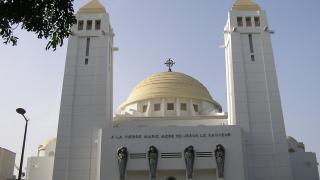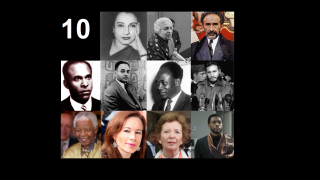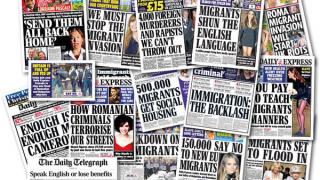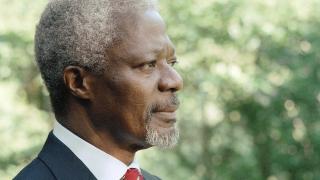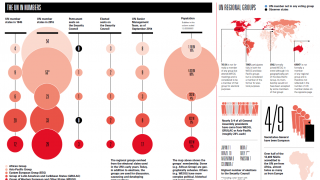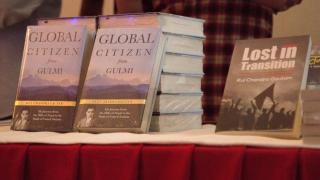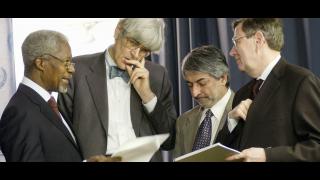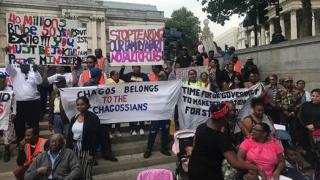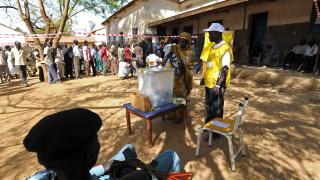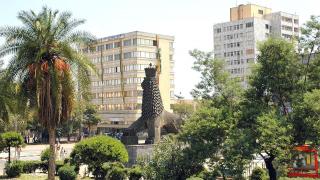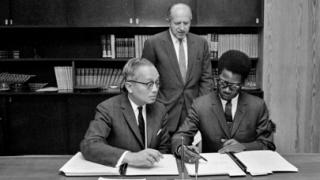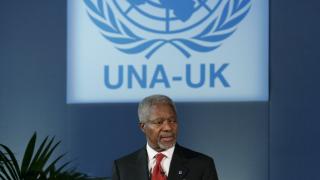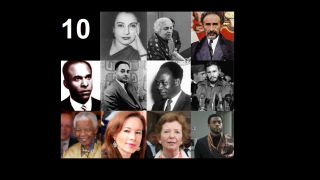
The UN is often criticised for reflecting the world in 1945, when a third of its population lived in dependent territories. The Security Council’s permanent members continue to wield disproportionate influence despite shifts in global power, while others – particularly African states – are underrepresented. UN programming, in trade for instance, has been accused by some of reflecting Western priorities and interests. In 1961, philosopher Frantz Fanon wrote: the UN is the legal card used by imperialist interests when brute force has failed.
But from sustainable development to sustained UN action on decolonisation, Southern concerns have always been integral to the UN’s work. The UN cannot escape global power dynamics. It has been a platform for both neoimperialist and revolutionary leaders. But it has also proved a valuable tool for people around the world, inspired by its promise of a life in larger freedom. Here we provide a snapshot of this story through 10 quotes.
1.
“In matters of discrimination on racial and national grounds … America, England, and many other European countries, to my great surprise, took up an extraordinarily reactionary attitude. They categorically opposed, article by article, all specific mention of non-discrimination.”
Shaista Ikramullah of Pakistan, writing in 1948. Ikramullah was her country’s delegate to the General Assembly’s Third Committee and worked on the Universal Declaration of Human Rights
2.
“In the dynamic world society which is the objective of the United Nations, all peoples must have equality and equal rights … The UN does not seek a world cut after a single pattern, nor does it consider this desirable. The UN seeks only unity, not uniformity, out of the world’s diversity.”
Ralph Bunche, UN Under-Secretary-General, 1950 Nobel lecture. He was the first African-American to win a Nobel Prize, for brokering the 1949 Arab-Israeli armistice
3.
“It is a hopeful feature of this year’s session of the General Assembly that several delegations have referred to the importance and urgency of solving colonial problems … [and] that of 800 million dependent people in the world at the end of the Second World War, no less than 600 million had achieved
their freedom in these few years.”
Vijaya Lakshmi Pandit of India, first female President of the General Assembly, speaking in 1952
4.
“For years, Africa has been the footstool of colonialism and imperialism, exploitation and degradation. … Those days are gone and gone forever, and now I, an African, stand before this august Assembly of the United Nations and speak with a voice of peace and freedom, proclaiming to the world the
dawn of a new era … There are now 22 of us and there are yet more to come.”
Kwame Nkrumah, President of Ghana, 1960, the year 16 African countries joined the UN
5.
“Until the philosophy which holds one race superior and another inferior is finally and permanently discredited and abandoned … until the colour of a man’s skin is of no more significance than the colour of his eyes; until the basic human rights are guaranteed to all, without regard to race … the African continent will not know peace.”
Haile Selassie, Emperor of Ethiopia, at the General Assembly in 1963, later set to music by Bob Marley
6.
“The UN understood this very well that racism in our country could not but feed racism in other parts of the world as well. The universal struggle against apartheid was therefore not an act of charity arising out of pity for our people, but an affirmation of our common humanity.”
Nelson Mandela, addressing the UN as South Africa’s President in 1994. That year, apartheid was removed from the UN’s agenda after nearly half a century
7.
“Wealth is still concentrated in the hands of a few powers whose wasteful economies are maintained by the exploitation of the labour as well as the transfer and the plunder of the national and other resources of the peoples of Africa, Latin America, Asia and other regions of the world.”
Fidel Castro, President of Cuba, speaking on behalf of the Non-Aligned Movement in 1979. The Movement now has 120 member countries
8.
“Asking people to face up to the problems of racism in their midst is not always welcome … It is always easier to point the finger of blame than to look hard at our own prejudices … the UN must not only continue its historic fight against discrimination, but must intensify that struggle.”
Mary Robinson of Ireland, UN High Commissioner for Human Rights, at the 2001 World Conference against Racism in Durban
9.
“Inequality has deprived many societies of hope and opportunities. The absence of dreams and a meaning in the future is being used to divide our communities, intensifying racism, xenophobia and violence, all of which represents the exact opposite of the Charter we adopted in 1945.”
María Espinosa Garcés of Ecuador, speaking in 2018. She is only the fourth female General Assembly President
10.
“Now, more than ever, the illusions of division threaten our very existence. We all know the truth: more connects us than separates us. But in times of crisis, the wise build bridges while the foolish build barriers.We must find a way to look after one another as if we were one single tribe.”
T’Challa, fictional superhero and head of state created by Marvel Comics, speaking at the UN in the 2018 film Black Panther


